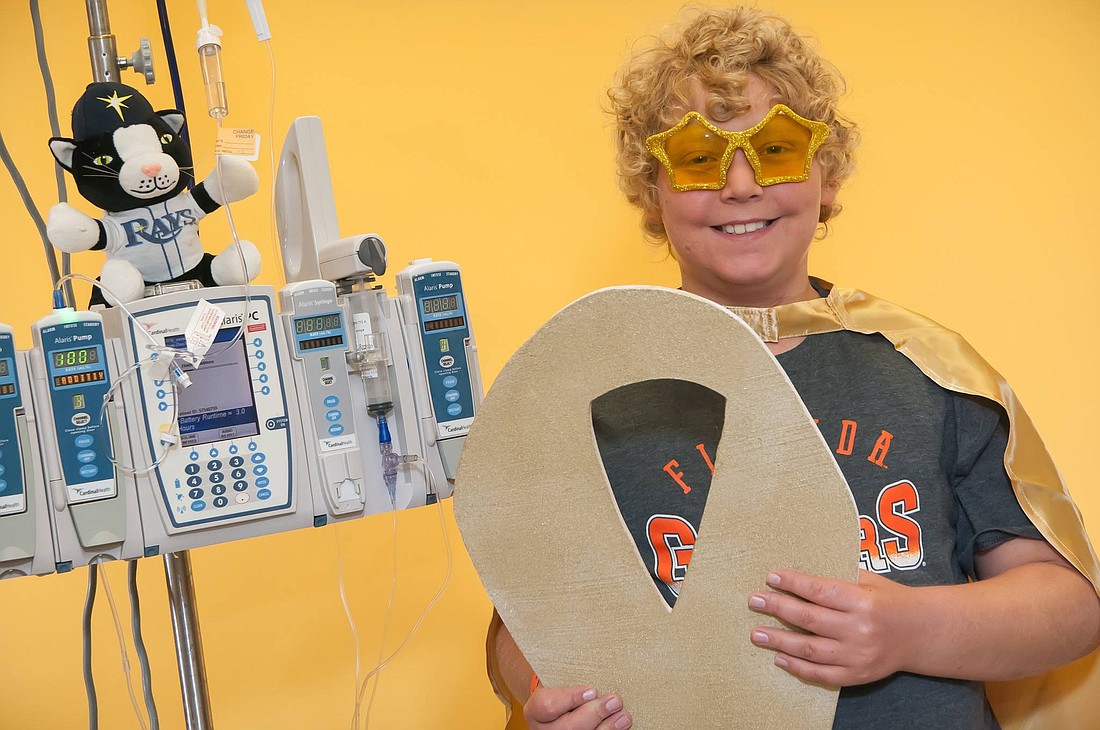- July 26, 2024
-
-
Loading

Loading

The color gold carries lofty connotations. It’s the color of wealth, champions and royalty. But for Laura Gilkey, it’s the color of resilience.
Gold is the trademark color of childhood cancer awareness, and this month, Gilkey will likely see a lot more of it. September is National Childhood Cancer Awareness Month.
It’s a busy time for Gilkey. She’ll campaign on behalf of children with cancer and their loved ones. She’ll raise money for her foundation, the Benjamin Gilkey Fund for Innovative Pediatric Cancer Research, named for her son who died Feb. 11 of leukemia.
Gilkey has teamed up with the Tampa Bay Rays, who will donate a portion of ticket sales Sept. 17 to the fund. Gilkey also invites the community to wear gold Sept. 29 to raise awareness for childhood cancer.
The National Cancer Institute estimates that 15,270 children 19 and under will be diagnosed with cancer in 2017, and 1,790 will die. Of those diagnosed, approximately 10,270 will be 14 and under.
These are statistics Gilkey doesn’t take lightly. She knows four Sarasota children who lost their battles with childhood cancer in the past year, her son Benji among them. But they also aren’t statistics that Gilkey is content to leave unchanged.
“Everybody should be motivated,” Gilkey said. “Childhood cancer research helps all cancer research — it applies to everyone.”
On Valentine’s Day, three days after Benjamin Gilkey died, Laura Gilkey announced the creation of the foundation in his honor.
Her son was affectionately known as Benjamin the Brave.
The fund benefits Johns Hopkins All Children’s Hospital in St. Petersburg, but its impetus is here in Sarasota.
“Even though I focus on All Children’s, it’s obviously very much a local issue,” Gilkey said. “If you have a child diagnosed with anything serious, you are going to go to All Children’s.”
The foundation targets research in the fields of genetic predispositions, immunotherapy and toxicity to chemotherapy, all factors in Benjamin Gilkey’s cancer. So far the fund has raised $190,000, and Gilkey said she is confident it will exceed $200,000 by the end of September, which will go toward research at All Children’s.
She’s is no stranger to All Children’s. It’s where her son received treatment, and it’s where, she hopes, the next breakthrough in children’s cancer research will take place.
“Dr. (Benjamin) Oshrine really took such good care of him,” Gilkey said “It was relentless. They were very innovative, and I just felt like he was so close. I just feel very confident that if we can support them financially that some sort of amazing breakthrough will happen and he can walk into another hospital room and make some family’s day.”
For Gilkey, it’s all about the research.
“We’re just on the cusp that we are changing the way we treat some cancers,” Gilkey said. “I don’t feel that we are just throwing money at a problem. I really feel that it is an investment in a solution.”
She already sees that solution manifesting. The Food and Drug Administration announced Aug. 30 it approved a gene therapy that will give patients a second option after typical treatment methods have failed. It’s the kind of news that gives Gilkey hope. It’s the kind of news that makes Gilkey resilient.
“I feel like the best way that we can honor Benji’s bravery is to try and help another child survive (who) might not be able to today or their chances might not be as good without the research,” Gilkey said.